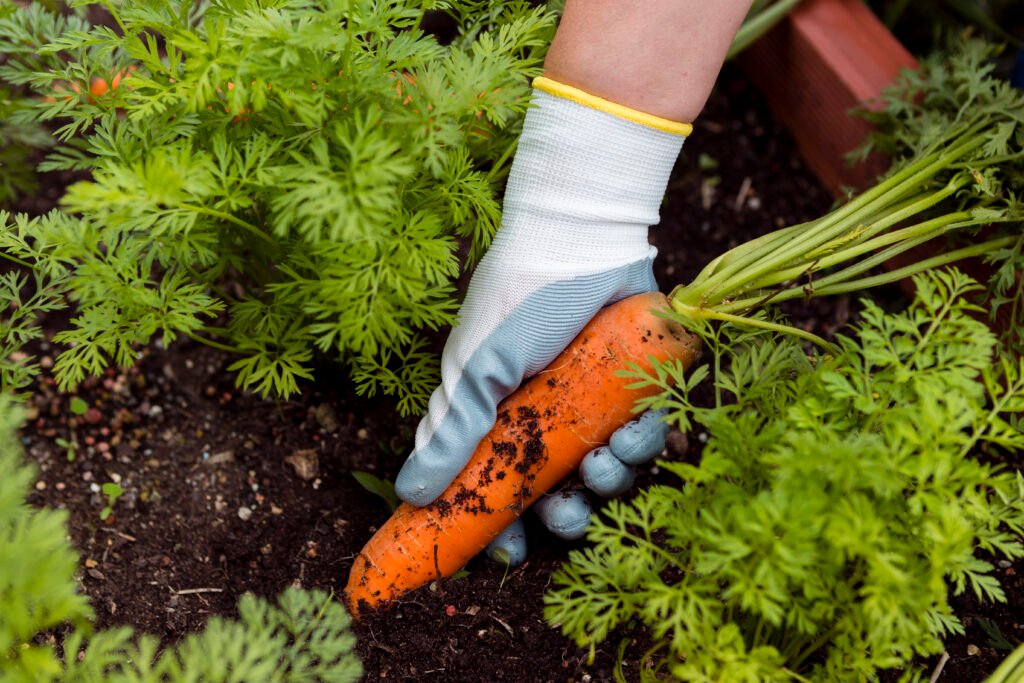Latest News
Carrot farming in India | A Profitable Root Crop for All Seasons

Carrot farming in India is gaining popularity due to its high market demand, short growing cycle, and suitability for diverse agro-climatic zones. With both desi and hybrid carrot varieties, farmers in states like Punjab, Karnataka, Haryana, and Maharashtra are making money. This blog discusses everything from harvesting and market potential to appropriate soil, seed selection, planting methods, and irrigation. Discover how to grow carrots for a profit with little outlay of funds and get steady yields all year long.
Why Growing Carrots Is a Wise Decision
A root vegetable high in beta-carotene, fibre, and vitamins A, K, and C is the carrot (Daucus carota). Because of its rapid growth and suitability for off-season and rabi cultivation, it is a lucrative crop for:

- Farmers who are small and marginal
- Growers that use organic
- Peri-urban farming and kitchen gardens
- The industries of contract farming and processed foods
- Climate: Cool to moderate temperatures (15°C to 25°C) are ideal for growing carrots.
- grows best in mild climates or during the winter.
- High temperatures can lead to poor colour or root cracking.
✅ Soil Conditions
Alluvial or sandy loam soils that are loose, deep, and well-drained
- pH of the soil: 6.0 to 6.8
- Steer clear of stony or heavy clay soils as they can cause deformed roots.
- Root development is straightened by fine tilth.
- Method of Sowing and Planting 📅 North India’s main planting season runs from October to December.
South India:
- July through February (possible multiple sowings)
- Areas with hills: March–May
Depth and Spacing Line sowing:
- 7–10 cm (plant-to-plant) and 30 cm (row-to-row)
- Depth of seed: 1.5–2 cm
- Rate of seeding: 4–6 kg/acre
🌱 Seed Care
Before planting, soak seeds for 12 hours in warm water or a slurry made from cow dung.
- Treat seeds with carbendazim or Trichoderma to control fungi.
- Management of Nutrients and Irrigation 💧 Irrigation Light irrigation right after seeding
- Watering frequently every six to eight days
- Steer clear of standing water as this can lead to root rot.
🌿 Well-decomposed manure and fertiliser FYM:
- 20–25 tonnes/acre
- 40:20:40 kg/acre is the NPK recommendation (apply in two to three split doses).
- Use organic farming inputs such as Jeevamrut or vermicompost.
- Control of Weeds, Pests, and Diseases
🌾 Weed Management Two to three times in the early stages by hand weeding or shallow hoeing
- To prevent weeds and preserve soil moisture, apply mulch.
- Aphids, root-knot nematodes, and cutworms are common pests.
- Apply bio-insecticides or neem oil for environmentally friendly control.
🍂 Common illnesses include bacterial soft rot, powdery mildew, and Alternaria leaf blight.

Rotate your crops and use disease-free seeds to avoid disease accumulation.
Harvesting and Production
- Depending on the variety, carrots can be harvested 90–120 days after they are sown.
- When the roots are the right size and colour, harvest.
- Steer clear of over-maturation since it results in a woody texture.
The Yield
Conventional Desi types: 10–12 tonnes per acre
Well-managed hybrid varieties: 15–20 tonnes per acre
Handling and Marketing After Harvest
- Rinse roots to get rid of dirt.
- Sort and grade according to shape, size, and colour.
- Stow in gunny bags or perforated crates.
- To increase shelf life, keep in cold storage between 0 and 4°C.
Fresh carrots can be purchased or used for:
- Pickles and juices
- Slices and powders that have been dehydrated
- processed foods that are ready to eat
- Carrot farming’s profitability 💰 Cost estimate per acre: ₹25,000 to ₹35,000.
- Income range: ₹80,000 to ₹1,20,000 (based on market rates)
Seasonally, net returns range from ₹40,000 to ₹80,000 per acre.
- In urban markets, carrots that are organic and in season are more expensive.
- Assistance is provided by the Mission for Integrated Development of Horticulture (MIDH) of the Government Support & Training.
- State departments of horticulture provide input subsidies.
- KVKs, or Krishi Vigyan Kendras, provide instruction in carrot farming.
- FPOs and agri-startups support direct-to-market business models.
In conclusion, growing carrots can increase income throughout the year.
Carrot farming presents a perfect opportunity for small-scale farmers and agribusiness owners due to its short growing season, low input requirements, and high consumer demand. Carrots can generate significant profits in a single season when paired with appropriate irrigation, pest management, and strong market connections. Farmers can produce high-quality carrots that satisfy demand both domestically and internationally by implementing sustainable farming methods and improved varieties.





















